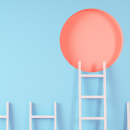How to focus: tips for tuning in
Learn how to focus and make your work more meaningful with this expert advice...

The pandemic has changed the way we work, and not always for the better. If you’re struggling to learn how to find your focus in this brave new world, come with Psychologies editor, Sally Saunders, on a journey, to discover how to tune in and make your work more meaningful and more enjoyable than ever…
Full disclosure here: I’ve never been the most confident person in the world. But if you had asked me a few years ago what my biggest strength was, I’d have had two words ready and waiting for you: Laser. Focus. I was up there with the best of them when it came to knowing how to focus, working at high speed, with accuracy and skill, never distracted from a task until it was complete. And, then…sorry, what was I saying?
Yes, somewhere along the line, the focus I relied upon during the first 10 years of my career seems to have gone AWOL. Ebbed away. Dried up. Disappeared. Vamooshed. Whatever way you want to put it, it’s gone. And, right now, I really wish it would come back.
After all, I have a lot to do. Running a magazine means my inbox is full of tasks: arrange a logo, pay an invoice, agree a page design. All are urgent; each one needs doing this instant (or sooner).
And now I’ve decided to write this article, in the slightly forlorn hope that I might just jolt myself into rediscovering a little bit of that laser-focus magic I used to own. Please don’t get me wrong, I’m not saying I don’t work hard. I spend hours at my laptop daily, am frequently in meetings, and constantly replying to emails. Sometimes I even manage to get some work done!
But at the end of most days I find myself asking, ‘Where did all the time go?’ Officially, I tell myself that I only work part time, but frequently my tasks seem to expand into all available space, spilling over into my ‘days off’ and beyond. And I’m not alone.

How the pandemic affected our focus
According to the World Economic Forum, the average working day lengthened by 48 minutes in the first six months of the pandemic. We’re working for longer, but where’s the pay off? It turns out I may be one of millions struggling with ‘pandemic brain’, explains Dr Emma Yhnell, a senior neuroscience lecturer at Cardi University.
‘Pandemic brain’ is a term used to describe the way that living through a pandemic environment has impacted our mental health and mental wellbeing. ‘We’ve seen lots of change, and increased levels of stress and isolation, particularly during the lockdowns,’ says Dr Yhnell.
‘All of which can impact the way our brains function. And focus is one of the main things to be a effected. Our brains are constantly bombarded with information, and we have to selectively pay attention to it,’ she continues.
‘We know that the more distractions there are, the less focused we become. In the pandemic, when we were concerned about our health and that of our friends and family, the levels of uncertainty led to our minds wandering.’
Losing the work life balance
On a more basic level, the way we work now has also changed. Like so many office-based workers, I’ve seen my daily routine change massively during this period. ‘The lines between what is work and what is home have blurred,’ says Dr Yhnell.
‘Previously, we were able to use commuting time to decompress, putting a literal gap between work and home.’ Now, many of us face more distractions during the working day – be it the kids, the dog, or the washing – and the environment at home is psychologically very different.
We feel more comfortable, and when we are online, we don’t have the same social cues to encourage us to keep going. This new way of working is really tiring, says Dr Yhnell: ‘The constant use of screens takes its toll. Where before we may have alternated our work, spending some time at a screen, then meeting in person, now we no longer get a break.’
That certainly feels true to me. I find myself constantly swapping from computer-based task to computer-based task, checking emails whilst waiting for an image to download. Not a second is wasted – or so I tell myself.
But in my drive to do all my many little jobs and be as ‘productive’ as possible, something is being lost. I feel sad that the job I love is getting swamped, and I feel too foggy to enjoy it.

Can we overcome ‘pandemic brain’?
‘There is good news, however,’ Dr Yhnell tells me. ‘Lots of the impact of pandemic brain is down to the stress of living through it, and if there’s one thing we know about the human brain, it’s that it is remarkably resilient – I’m hopeful things will soon start to feel better.
‘But it’s vital to remember that this isn’t just an issue about focus, but about improving our mental health. Remind yourself why you’re doing something, and rethink your expectations of yourself.’
With these words ringing in my ears, I decide it’s time to find out why being busy all day doesn’t mean I get my work done, and start looking for some ways I can feel more focused – and more fulfilled.
Are you focused on busyness?
My story of spending hours being very, very busy but rarely managing to accomplish all my tasks is familiar to life coach Julia Wolfendale, author of Five Ways To Focus (On The Up Books, £9.99). ‘A lot of the time, we’re caught up with the “busy”, and the busy seems to be driven by the external, by what we think are other people’s expectations of us,’ Wolfendale explains.
‘That might be our boss, or it might be something that we’re seeing on social media: these are the holidays we should be having, these are the things we should be doing with our children, these are the things we should have achieved by now in our careers.
‘All that external stimulation can lead to a sense of unease and dissatisfaction, and challenge yourself-worth,’ she explains. ‘And one way we counteract that is by being busy all the time. We wear it like a big badge, something to be proud of. I think understanding your own personal connection to busyness is important. Why does it matter to you?’
Busy for the sake of busy
On reflection, I have a sneaking suspicion that I combat difficult feelings of impostor syndrome by keeping busy with work, then feel frustrated when it doesn’t necessarily mean getting good work done.
For other people, it might be a case of ‘presenteeism’, and showing a demanding boss that you are working hard by being always available on email, always on camera in meetings. Whatever your reason, is it really such a bad thing, I ask.
‘Busy for the sake of busy can lead to burnout,’ Wolfendale warns. ‘So I say beware. Ask yourself, why is it so important to you to be busy. Is it more important that you’re productive, and you enjoy doing the things you feel matter and are meaningful?‘
It’s worth having an honest conversation with yourself and asking, “Why is it that busy feels so crucial to me?” If you’re getting a lot of self-worth from it, you may find you have taken your focus away from what it is that really matters to you.

Are you focused on productivity?
Just as busyness has become a cult for many of us there is also a drive to be seen as productive. Whether it’s balancing multiple roles or trying to move forward in your career, increased productivity has become the holy grail. There have been a slew of books and podcasts promising to make us productivity superstars, helping us to ‘smash it’ every day, working longer, harder, smarter.
But it’s a trend that has caused Dr Alice Boyes, psychologist turned author of Stress-Free Productivity (Ebury, £12.99), to fear the impact on our mental health.
‘I’ve been writing about this area for years now. There has been a huge push towards developing habits of focus, discipline and willpower in order to get more done,’ she explains. ‘But, remember, you’re not working to be the most productive writer, or the most productive lawyer. That’s not the point of your life. Productivity alone isn’t the end goal.
‘This constant focus on churning out work is treating us like robots,’ says Dr Boyes. ‘But humans make poor robots – let’s focus on being human! Your experiences outside of work – your hobbies, your interests, the things that make you different from everyone else who has followed the same career path – are part of your package. And when you bring those into work, you might come up with an idea no one else could ever have thought of.’
Multiple paths to success
It’s certainly true for me, as my life is what made me want to write this article in the first place, after all. Not only do I struggle with focus, but my husband has ADHD. This means I’m more than aware of the way my life circumstances give me insight into this subject, and perhaps come at it from a different angle to most writers.
I explain this to Dr Boyes, and her eyes light up at my motivation. ‘A lot of the writing on focus seems targeted at privileged men and helping them do more, to free up more time, to make more money,’ she says.
‘But there are multiple paths to success, and other ways that are more inclusive – whether it’s to women, neurodiverse people, or people of colour,’ she explains. ‘You don’t have to buy into the hustle culture, where the only point is to do more work in less time so you can also have a side hustle and make your millions,’ says Dr Boyes.
‘It’s about so much more than that. Can you find focus to help you do better work? And what is the impact of that on your mental health? I think it can only be good.’
How to focus on quality over quantity
I decided to write this article a few weeks ago, when I found myself grumbling about my lapses in attention to a friend. I was telling her how I was struggling to fit everything in to my part-time hours, as the many different parts of my job conflicted with each other. All this seemed to draw me away from the central aspects of writing and editing a great magazine.
‘I don’t want to work harder, just smarter,’ I explained. I’d been taught the phrase on management courses and it seemed to make sense at the time. But did it really apply to me?
After all, it wasn’t like I was wasting my time on Instagram or watching cat videos. (I’d already installed a productivity app on my computer that patted me on the head and told me I was a good girl and wasted very little time-larking about on social media.)

‘Work smarter not harder’
So was ‘smarter not harder’ really the answer? ‘One of the main ideas around focus is that goofing off and being distracted is our big problem,’ reflects Dr Alice Boyes. ‘Even though there are some problems with human self-regulation, we’re actually reasonably good at that.
‘I think the bigger problem is doing huge volumes of the type of work that doesn’t really matter. People are trying to learn and succeed and grow through doing massive amounts. However, it’s just not useful for producing really innovative work. And it’s not useful for mental health.
‘I always say, the direction you’re rowing in is going to be far more determinant of where you end up than how fast you’re rowing. So it’s not dossing about a little here and there that’s going to stop you doing something meaningful, but expending all your energy on moderately productive work.’
Again, my need to be busy seems to be getting in the way. Frequently, I’ll work all day, but it’s not always the work I should be doing. Paperwork has never been my forte, so why do I still insist on doing it all myself? What direction should I really be rowing in? Could it be time to strike out in a new one?
Making time for creativity
‘Often, people don’t push themselves to be bold,’ Dr Boyes explains. ‘The vast majority of people don’t put any focus on creativity. But the effort that you put into trying to be innovative is proportional to what success you have. It’s not about how much work you do, but the quality of the work you do – the meaningful, impactful work that you do.’
It’s an issue I recognise all too well. We all have those tasks that need to be done – frequently urgently – and so we shift them to the front of the queue; to the top of our to-do list. Whereas the important, creative, thinking work that takes time but could make a difference, continues to linger at the bottom.
‘We often see urgency leading to inefficiency,’ agrees Dr Boyes. ‘It’s easy to spend time doing things that are urgent but aren’t that important. These tasks with short deadlines tend to be shorter tasks. Shorter tasks tend to be less innovative, because long tasks often mean harder problems. So we do them, tick them off, and perhaps get a quick thrill of satisfaction.
‘But with longer tasks, you go much deeper, and you can bring so much more of yourself to them. You learn the skills you need for them over a period of time – you develop more connections around them. You give more focus to them, but you can also get much more back in return.’
Getting started with ‘deep work’
Alicia Navarro, CEO and founder of FLOWN, a web-based service aiming to make ‘deep work’ more accessible to more people, agrees that we may need to rethink our end goal. ‘Sometimes people talk to me about productivity, ’she says. ‘But, really, productivity is always a consequence of what we do.
‘I’m not a productivity expert. Also, I’m not into productivity apps. I’m into what it is that helps make us achieve our best work’. Frequently, this comes down to preparation, Navarro explains:
‘Sometimes, it’s about making sure that when we do actually sit down to focus on work that’s of worth, we’re ready for it. It means taking care of your body and your emotions, so you’re able to give your all. It’s also about organising yourself so you have the best chance.
‘All too often we try to do deep work around other meetings and calls,’ reflects Navarro, ‘and we prioritise shallow work. Then, you finish your day feeling like you haven’t achieved anything. What I encourage people to do is prioritise your day around deep, meaningful work. Then, let the shallow work fit around that.’

Why learning how to find focus matters
Since the dawn of time, human beings have had to deal with distractions. Our cave women ancestors no doubt found it tough to focus on collecting enough berries for tea, if they also had to make sure that the baby wasn’t getting eaten by a sabre-toothed tiger.
What is a ‘change point’?
But why has it suddenly become such a crucial issue? Julia Wolfendale believes the pandemic could well be a “change point”. ‘This is something I’ve come across a lot in my work with clients. It’s a point of change that leads to people suddenly reassessing things,’ she says.
‘It might be a milestone age, kids leaving home, a divorce. And the pandemic has created an even bigger change point. It’s led us all to wonder “Is this it?” and ask “What’s next? What am I supposed to do now?”
‘So, if that’s how you’re feeling, you have to get back to what matters to you. Forget the boss for a minute. Forget all the other demands on you and all the expectations that are telling you what you should be doing and how you should be doing it. And just take the time to focus on you,’ urges Wolfendale.
‘That means asking yourself the question: What really matters? What brings you here? Why is it that you want to find focus in your life? And what would it help you to do, if you did have focus?
Find what matters to you
‘It’s like finding your guiding light,’ says Wolfendale, ‘because once you know that, it’s within you, and you can keep checking back in and use it to reset. You can use that same information to point your way forward. This will mean that the decisions you make in life – the things you spend your time on – are driven by the things that matter to you.
‘And when you look at the results – when you’re actually trying to generate the work you’re actually interested in, and doing work that matters to you – you’re going to feel so much happier. That’s when you realise you’re focusing on what matters, rather than just focusing on getting stuff done.’
Simple coaching exercise to find focus:
Write these bullet points on a post it and stick it near your desk or computer, so that you can keep it in sight when you start to lose your thread. It’s a powerful coaching exercise that helps you…
- State your current position.
- Note what you want to be different.
- Set out your intention.
- Bring into sharp focus what you want.
- Be clear about why these things matter to you.

How to find focus: 6 steps
So how do we improve our focus and give ourselves the chance to do more meaningful work? Alicia Navarro, founder of FLOWN, shares her ideas on how you can find fulfilment…
‘After spending more than a decade at the successful company I had created, SkimLinks, I was looking for a new challenge,’ says Navarro. ‘So I went travelling, learned new skills, and discovered that every time that I was doing something really novel and exploratory, often in nature, I would have an explosion of creativity.
‘I’d often have to sit down immediately and start taking notes, to capture my ideas. Something about being in nature and outside my normal comfort zone gave me the space to see connections that had been latent before.
‘I then read the book Deep Work by Cal Newport (Little, Brown, £14.99) and suddenly everything made sense. It lays out how so many of the greatest thinkers had one thing in common: sometimes they would step away from their normal environment to focus on something that was significant. And this was how the greatness of human potential was being realised.
‘It struck me, isn’t it nuts, then, that we know this about human potential and yet the way we work – the offices, the meetings, the monotony – presents the opposite. I developed a new business around the idea, running “deep work” sessions to help boost focus and creativity.’
Discover how, you too, can learn how to focus and make your work meaningful…
1. Have focused bouts of work
‘Ring-fence periods where you choose to do deep work. Turn off your email, put your phone on silent, and commit.
‘In our app, we run two-hour deep-dive sessions, where you work for 50 minutes followed by a 15-minute break, followed by another 50 minutes, with a five-minute check-in at the end.’
2. Play and explore
‘During focused sessions, when you take your short break, allow your brain to relax. It might be a puzzle or a game, or you might play an instrument for a few minutes.
‘When you’re in a cerebral space, it’s important sometimes to detach and connect with a more physical and sensual space. This leads to a more resilient and more creative mind.’
3. Create new rituals
‘Remember the daily coffee you used to pick up on your way to the office each morning? And the podcast you’d listen to on the train home? We’ve lost so many of these rituals. So what are the new rituals that you can weave into your day that you can infuse with meaning?
‘Rituals have three things: repetition, attention, and intention, so it might be as simple as a morning tea ritual before you begin a period of deep work, which helps you feel that the work you do afterwards is going to have real meaning and purpose.’

4. Access green spaces
‘Being in nature is brilliant for creativity. A recent study showed that even 40 seconds of gazing at a natural scene on your computer can boost your focus by 8 per cent for the next hour. And getting out into one for real is even better.
‘Go for a walk along a path you’ve never been down before, and try to notice new things. Play a game where you tune into the sounds or notice the smells of different things. This can really help connect the cerebral and the sensual.’
5. Exercise mind and body
‘Looking after your physical and emotional needs through self-care activities – such as exercise, good nutrition and meditation – will boost your mind’s resilience and creativity.’
6. Engage with diverse people and ideas
‘Often, nowadays, we don’t interact with as many people as we used to on a daily basis. Some days, you may only speak to your partner, or maybe two or three people in your team. But your brain needs access to challenging things, or things that invert your perception and surprise you – because that’s how you continue to create new neural pathways.
‘So, make sure that you’re getting outside and talking to people, and that you’re curious and inquisitive. Ask questions, and allow yourself to see things from a different view. We need that boost for our ability to be creative.’
Finding a new work-life balance
After some very interesting conversations with our experts, and a few days trying out apps, playing with my working patterns, and incorporating some of the techniques I’d learned about, I now have a new toolkit, and am finding it easier to engage with work in a meaningful way – and spending a lot less time checking emails!
But Dr Alice Boyes has more words of wisdom on the question of work-life balance that come as a bit of a surprise. ‘It’s a topic we’ve talked about for a long time, but the picture is really changing now,’ she reflects.
‘For a while, people have been saying you should be absolutely laser-focused at work, so you don’t have to think about it at all when you’re not there. But that’s not what creative people do. It’s not even what scientific people do. When Isaac Newton was relaxing under the apple tree, discovering gravity, he wasn’t not thinking about work!
‘Work needs to be part of your life, and your life has to be part of your work,’ she says, ‘and that means that sometimes you can use your downtime for work, too. If you’re trying to achieve everything you want to achieve by using your focused mind, you’re working way too hard.
‘If, instead, you let your mind wander onto a work task when you’re not at work, you might find you increase your productivity. And the good news is it’s mentally healthy, because it’s easier to do it that way.’
Allow your mind to wander
Dr Boyes describes how she now follows periods of intense focused work with something that allows the mind to wander:
‘It might be driving in the car, or going for a walk, but I find I automatically start to reorganise the things I was working on during my deep focus, or spark new ideas I hadn’t had before. Sometimes I even write entire blog posts in my head, inspired by the deep-focus work I was just doing.’
For Dr Boyes, building in activities to let the mind wander is now vital: ‘I’ll drive to my favourite bakery 15 minutes away, and my brain will start to do the work on its own, making those connections. ‘You need to experiment to find what are the really fruitful times for you,’ she continues.
‘It will be different to mine, and different to everyone else’s. But when you find it, it will help you find your focus and feel much happier about it, too.’

Find what works for you
And she’s right. I don’t have to work constantly to have interesting thoughts about work. I planned this article out in my head while walking with my young daughter, playing and picking flowers. Then, I made connections I hadn’t thought about while in the bath, and remembered crucial details I’d overlooked while driving my son home from school.
I’d done the hard yards sat at my laptop, but I tied it all together when my mind was relaxed. I’ve realised I don’t necessarily need that laser focus any more. I’m enjoying my writing and feeling more fulfilled and creative. Am I doing better work now? Only time will tell…









